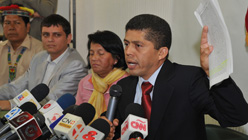Last week, KQED’s Kelly Wilkinson talked about the case with Cynie Payne, a Rutgers University assistant professor and former UC Berkeley lecturer who specializes in international and environmental law. Here’s an edited transcript:
How significant was the latest ruling?
The most recent ruling by the Ecuador appeals court is one step in the process. US courts are similar to Ecuador courts – first trial, then appeals, then Supreme Court. So there’s one further level of review in this case.
Chevron says it doesn’t believe the ruling is enforceable and basically they have no intention of paying. Is there a point where this gets resolved or does it just keep going?
The normal course would be for Chevron to appeal the ruling in the courts of Ecuador and once that appeal goes to the Supreme Court there they get a final decision. Should the Supreme Court uphold the lower courts’ decisions, Ecuador would seek to enforce that in any country where Chevron has assets.
So it doesn’t need to be in Ecuador…
Yes, the plaintiff can try to recover the judgment in any country where Chevron has holdings. After the initial trial court decision in Ecuador, Chevron went to US courts and sought a ruling that attempts to prevent any country from honoring the decision in Ecuador’s courts. That was overruled by a US Appeals Court, which said it’s not possible for US courts to dictate to courts of other sovereign nations.
Originally, Chevron wanted the trial originally to take place in Ecuador, correct?
That’s one of the peculiar aspects of this case. Originally it was brought by Ecuadoran plaintfiffs in US court and Chevron argued strenuously to a US court that in fact Ecuador was the most appropriate place to try the case. So the US court said fine, bring the proceedings to Ecuador, which the plaintiffs did. But they didn’t the results they had hoped for.
What about this case is making it drag on so long?
Cases like this typically do take a long time. This case was originally filed in the US in one state, was removed to another state, and then it went to Ecuador. That extended the proceedings, and there were also lengthy factual findings and investigations with a court-appointed expert in Ecuador looking at the actual sites where the pollution was alleged to occur.
By comparison, you might think of the Exxon Valdez oil spill, which occurred decades ago but only recently wound up in the Supreme Court.
So could it be one strategy of Chevron to draw out the proceedings?
Chevron has taken a very aggressive litigation strategy in challenging this decision in numerous forums, including in international arbitration that’s based in The Hague. In fact courts that are asked to compel Chevron to pay the Ecuador judgmentwill need to take a look at that Hague arbitration proceeding, too.
This is like a long-running melodrama. There will be another installment. The next step will be the Supreme court of Ecuador – when that decision comes, the plaintiffs will be free to try to collect the judgment. Then there will be much more complicated legal issues to look at because of the multiple places these things are going forward – US courts and international arbitration.
I think there’s an interesting element to this case that may be replicated in other places. The case is all based in facts going back to the middle of the 20th century when there was a kind of free-for-all exploitation of natural resources in the developing world by developed countries. And the understanding and appreciation of the value of the resources and the problem of pollution have changed to some extent, so some of these settlements or agreements made with governments back in the 1960s or 1970s may seem highly inequitable to the current government of the country and to the general public.
That’s the underlying issue of this case: It’s very difficult for the legal system to address that problem.
It may be that these things should not be handled in a litigation context. In light of the Chevron-Ecuador situation and the charges leveled on both sides about procedural misdeeds it seems that this has not been an efficient process that holds any of the parties up in a good light.
In the US we have a very strict Superfund law. So it may be that when you dropped your dry cleaning waste in the water, you didn’t know you were going to pollute it. But nevertheless you and your successor companies are responsible for cleaning it up. That is legislation that has been applied widely to all types of pollutants. A similar approach may be appropriate in this case.
